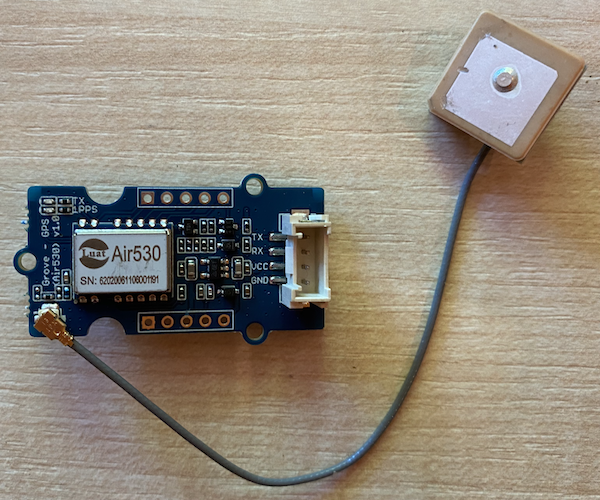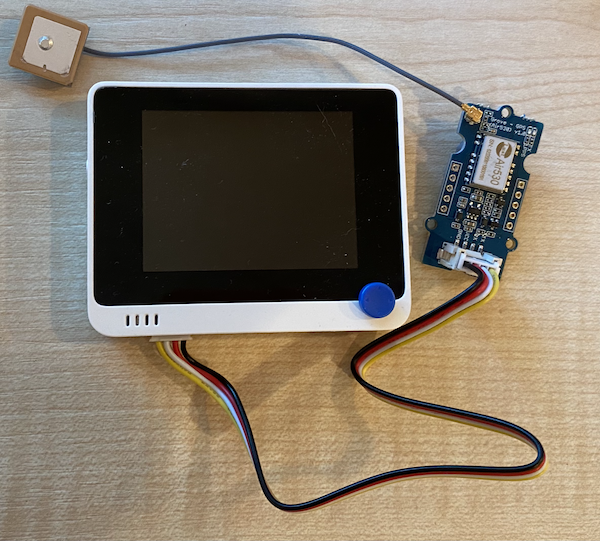5.1 KiB
Read GPS data - Wio Terminal
In this part of the lesson, you will add a GPS sensor to your Wio Terminal, and read values from it.
Hardware
The Wio Terminal needs a GPS sensor.
The sensor you'll use is a Grove GPS Air530 sensor. This sensor can connect to multiple GPS systems for a fast, accurate fix. The sensor is made of 2 parts - the core electronics of the sensor, and an external antenna connected by a thin wire to pick up the radio waves from the satellites.
This is a UART sensor, so sends GPS data over UART.
Connect the GPS sensor
The Grove GPS sensor can be connected to the Wio Terminal.
Task - connect the GPS sensor
Connect the GPS sensor.
-
Insert one end of a Grove cable into the socket on the GPS sensor. It will only go in one way round.
-
With the Wio Terminal disconnected from your computer or other power supply, connect the other end of the Grove cable to the left-hand side Grove socket on the Wio Terminal as you look at the screen. This is the socket closest to from the power button.
-
Position the GPS sensor so that the attached antenna has visibility to the sky - ideally next to an open window or outside. It's easier to get a clearer signal with nothing in the way of the antenna.
-
You can now connect the Wio Terminal to your computer.
-
The GPS sensor has 2 LEDs - a blue LED that flashes when data is transmitted, and a green LED that flashes every second when receiving data from satellites. Ensure the blue LED is flashing when you power up the Pi. After a few minutes the green LED will flash - if not, you may need to reposition the antenna.
Program the GPS sensor
The Wio Terminal can now be programmed to use the attached GPS sensor.
Task - program the GPS sensor
Program the device.
-
Create a brand new Wio Terminal project using PlatformIO. Call this project
gps-sensor. Add code in thesetupfunction to configure the serial port. -
Add the following include directive to the top of the
main.cppfile. This includes a header file with functions to configure the left-hand Grove port for UART.#include <wiring_private.h> -
Below this, add the following line of code to declare a serial port connection to the UART port:
static Uart Serial3(&sercom3, PIN_WIRE_SCL, PIN_WIRE_SDA, SERCOM_RX_PAD_1, UART_TX_PAD_0); -
You need to add some code to redirect some internal signal handlers to this serial port. Add the following code below the
Serial3declaration:void SERCOM3_0_Handler() { Serial3.IrqHandler(); } void SERCOM3_1_Handler() { Serial3.IrqHandler(); } void SERCOM3_2_Handler() { Serial3.IrqHandler(); } void SERCOM3_3_Handler() { Serial3.IrqHandler(); } -
In the
setupfunction below where theSerialport is configured, configure the UART serial port with the following code:Serial3.begin(9600); while (!Serial3) ; // Wait for Serial3 to be ready delay(1000); -
Below this code in the
setupfunction, add the following code to connect the Grove pin to the serial port:pinPeripheral(PIN_WIRE_SCL, PIO_SERCOM_ALT); -
Add the following function before the
loopfunction to send the GPS data to the serial monitor:void printGPSData() { Serial.println(Serial3.readStringUntil('\n')); } -
In the
loopfunction, add the following code to read from the UART serial port and print the output to the serial monitor:while (Serial3.available() > 0) { printGPSData(); } delay(1000);This code reads from the UART serial port. The
readStringUntilfunction reads up until a terminator character, in this case a new line. This will read a whole NMEA sentence (NMEA sentences are terminated with a new line character). All the while data can be read from the UART serial port, it is read and sent to the serial monitor via theprintGPSDatafunction. Once no more data can be read, theloopdelays for 1 second (1,000ms). -
Build and upload the code to the Wio Terminal.
-
Once uploaded, you can monitor the GPS data using the serial monitor.
> Executing task: platformio device monitor < --- Available filters and text transformations: colorize, debug, default, direct, hexlify, log2file, nocontrol, printable, send_on_enter, time --- More details at http://bit.ly/pio-monitor-filters --- Miniterm on /dev/cu.usbmodem1201 9600,8,N,1 --- --- Quit: Ctrl+C | Menu: Ctrl+T | Help: Ctrl+T followed by Ctrl+H --- $GNGGA,020604.001,4738.538654,N,12208.341758,W,1,3,,164.7,M,-17.1,M,,*67 $GPGSA,A,1,,,,,,,,,,,,,,,*1E $BDGSA,A,1,,,,,,,,,,,,,,,*0F $GPGSV,1,1,00*79 $BDGSV,1,1,00*68
💁 You can find this code in the code-gps/wio-terminal folder.
😀 Your GPS sensor program was a success!

